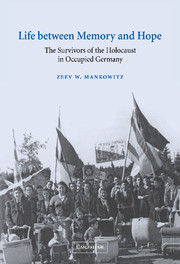Book contents
- Frontmatter
- Contents
- Plates
- Acknowledgments
- Abbreviations and note on spelling and dates
- Introduction
- 1 The occupation of Germany and the survivors: an overview
- 2 The formation of She'erith Hapleitah: November 1944 – July 1945
- 3 She'erith Hapleitah enters the international arena: July–October 1945
- 4 Hopes of Zion: September 1945 – January 1946
- 5 In search of a new politics: unity versus division
- 6 The Central Committee of the Liberated Jews in Bavaria
- 7 The politics of education
- 8 Two voices from Landsberg: Rudolf Valsonok and Samuel Gringauz
- 9 Destruction and remembrance
- 10 The survivors confront Germany
- 11 She'erith Hapleitah towards 1947
- Concluding remarks
- Bibliography
- Index
- Studies in the Social and Cultural History of Modern Warfare
4 - Hopes of Zion: September 1945 – January 1946
Published online by Cambridge University Press: 06 August 2009
- Frontmatter
- Contents
- Plates
- Acknowledgments
- Abbreviations and note on spelling and dates
- Introduction
- 1 The occupation of Germany and the survivors: an overview
- 2 The formation of She'erith Hapleitah: November 1944 – July 1945
- 3 She'erith Hapleitah enters the international arena: July–October 1945
- 4 Hopes of Zion: September 1945 – January 1946
- 5 In search of a new politics: unity versus division
- 6 The Central Committee of the Liberated Jews in Bavaria
- 7 The politics of education
- 8 Two voices from Landsberg: Rudolf Valsonok and Samuel Gringauz
- 9 Destruction and remembrance
- 10 The survivors confront Germany
- 11 She'erith Hapleitah towards 1947
- Concluding remarks
- Bibliography
- Index
- Studies in the Social and Cultural History of Modern Warfare
Summary
From the outset the dream of a Jewish home in Palestine permeated the public life of She'erith Hapleitah. The bitter fate of the Jewish people during the war was accounted for in terms of the vulnerabilities of minority life; Jewish resistance to the Nazis was celebrated as a primarily Zionist enterprise while the creation of a Jewish state in the Land of Israel was taken to be the last will and testament bequeathed by the dead to the living. The frameworks set up by the survivors in and around the DP camps – local and regional committees, the Central Committee of the Liberated Jews in Bavaria, political parties, youth movements, schools and training farms – were infused with the same spirit. For many, their almost intuitive Zionism stood for the warmth, unquestioning acceptance and security of home; for the more politically minded it signified the only real hope for the rescue and rehabilitation of the little that remained of European Jewry and, in the longer term, the promise of the Jewish future.
Edward Shils has suggested that
[the] need for an ideology is the intensification of the need for a cognitive and moral map of the universe … An ideology arises because there is a strongly felt need for an explanation of important experiences which the prevailing outlook does not explain, because there is a need for the firm guidance of conduct which, similarly, is not provided by the prevailing outlook, and because there is a need, likewise strongly felt, for a fundamental vindication and legitimation of the value and dignity of the persons in question.
- Type
- Chapter
- Information
- Life between Memory and HopeThe Survivors of the Holocaust in Occupied Germany, pp. 69 - 87Publisher: Cambridge University PressPrint publication year: 2002



